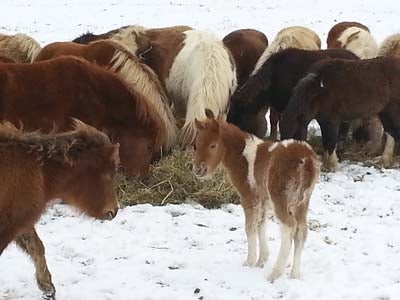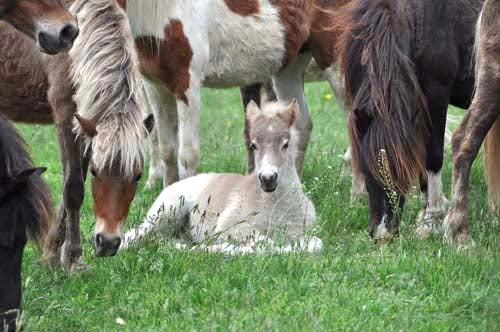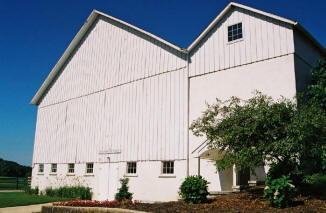Havemeyer Equine Behavior Research Laboratory
Overview
The Havemeyer Equine Behavior Research Laboratory at New Bolton Center has grown from within the Section of Reproductive Studies. Since the early 1980s the program, has had research as its core activity. The program has included involvement in related clinical and teaching in the veterinary school and continuing education programs nationally and internationally. The initial research focus of the laboratory was on stallion reproductive physiology and behavior.
Early research concentrated on the physiology and pharmacology of libido, erection, and ejaculation, with immediate application to clinical problems in breeding stallions and with relevance to the understanding of human sexual dysfunction.
Another long-standing research interest of our laboratory has been the effects of experience on sexual function. In the 1990s our research and clinical work expanded beyond stallions to include reproductive and general behavior problems of horses.
History

The Equine Behavior Program and Laboratory at New Bolton Center has grown from within the Section of Reproductive Studies. Since the early 1980s the program, has had research as its core activity. The program has included involvement in related clinical and teaching in the veterinary school and continuing education programs nationally and internationally. The initial research focus of the laboratory was on stallion reproductive physiology and behavior.
Early research concentrated on the physiology and pharmacology of libido, erection, and ejaculation, with immediate application to clinical problems in breeding stallions and with relevance to the understanding of human sexual dysfunction.
Another long-standing research interest of our laboratory has been the effects of experience on sexual function. In the 1990s our research and clinical work expanded beyond stallions to include reproductive and general behavior problems of horses.The Behavior Lab is housed in The Havemeyer Barn at The Georgia and Philip Hofmann Center for Animal Reproduction.
Research

Over the past three decades, the Havemeyer Equine Behavior Program has studied a wide range of equine behavior and reproduction topics, including:
- Play behavior
- Equine cognition concept learning
- Reproductive endocrinology and behavior of harem and bachelor stallions
- Stress physiology and behavior of semi-feral equids
- Leptin and MSH in fat and food-aggressive horses and ponies
- Methods of acclimation of semi-feral ponies to human handling
- The equid ethogram
- Inter-male interaction
- Parental behavior
- sexual behavior
- Developmental behavior

Facilities
The Behavior Lab is housed in The Havemeyer Barn at The Georgia and Philip Hofmann Center for Animal Reproduction.
The Havemeyer Barn is a 19th Century Pennsylvania Bank Barn that was renovated by The Dorothy Russell Havemeyer Foundation specifically to house behavior and physiology research program. It includes a stable for housing ponies, a breeding shed, semen and blood collection laboratory, a behavior library, conference room, offices, and flexibly designed facilities suitable for a variety of equine behavior studies.
Publications
Present – 2020
Torcivia, C., & McDonnell, S. M. (2025). Behavioral signature of equine gastric discomfort? Preliminary retrospective clinical observations. Animals, 15(1), 88.
Equine discomfort ethogram. Torcivia C, McDonnell S. (2021) Animals 11(2):580. https://www.mdpi.com/2076-2615/11/2/580
Development of the equine hindgut microbiome in semi-feral and domestic conventionally-managed foals. Tavenner MK, McDonnell SM, Biddle AS (2020) Animal Microbiome 2:43. https://doi.org/10.1186/s42523-020-00060-6
Harem stallion changes are not associated with diminished reproductive performance of females in semi-feral Konik polski horses (Equus caballus) Jaworska J, Jaworski Z, McDonnell SM, Gorecka-Bruzda A (2020) Theriogenology 151: (1-6). https://doi.org/10.1016/j.theriogenology.2020.03.033
In-person caretaker visits disrupt ongoing discomfort behavior in hospitalized equine orthopedic surgical patients. Torcivia C, McDonnell SM (2020) Animals 10, 210; doi:10.3390/ani10020210
Preliminary proof of concept of wild (feral) horses following light aircraft into a trap. McDonnell S, Torcivia C (2020) Animals 10 (1), 80
Evaluation of the effect of laboratory methods on semen analysis and breeding soundness examination (BSE) classification in stallions. Whitesell K, Stefanovski D, McDonnell S, Turner R (2020) Theriogenology 142: 67-76

Director, Volk Laboratory
Sue M. McDonnell, PhD
Adjunct Professor of Reproductive Behavior, New Bolton Center
Find Us
University of Pennsylvania
School of Veterinary Medicine
Havemeyer Equine Behavior Lab
New Bolton Center
382 West Street Road
Kennett Square, PA 19348
